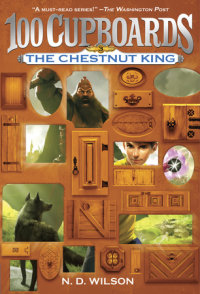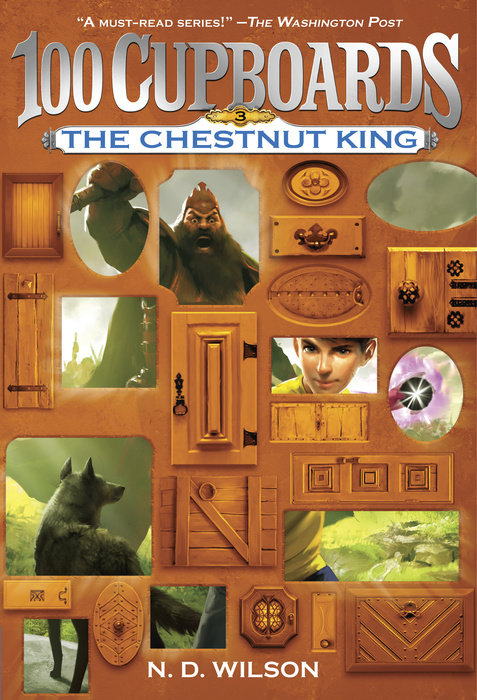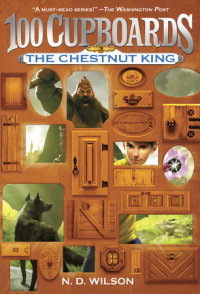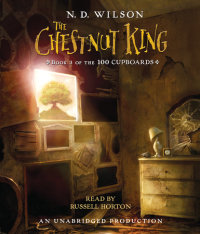The Chestnut King (100 Cupboards Book 3)
The Chestnut King (100 Cupboards Book 3) is a part of the The 100 Cupboards collection.
The bestselling and highly acclaimed 100 Cupboards series concludes with one final, epic battle in The Chestnut King. Perfect for readers who love Percy Jackson, the Unwanteds, and Beyonders!
Hidden cupboards behind Henry’s bedroom wall unlocked portals to other worlds that Henry and his cousin Henrietta couldn’t resist exploring. But they made one terrible mistake—they released the undying witch Nimiane. Her goal? To drain all life from every world connected to the cupboards. Henry must seek out the Chestnut King to defeat her, but doing so will force Henry to make a terrible, irreversible choice. With the fate of the worlds and everyone Henry loves hanging in the balance, will he have the courage to do what is needed to destroy the witch once and for all?
"A must-read series." —The Washington Post
An Excerpt fromThe Chestnut King (100 Cupboards Book 3)
Chapter One
Every year, Kansas watches the world die. Civilizations of wheat grow tall and green; they grow old and golden, and then men shaped from the same earth as the crop cut those lives down. And when the grain is threshed, and the dances and festivals have come and gone, then the fields are given over to fire, and the wheat stubble ascends into the Kansas sky, and the moon swells to bursting above a blackened earth.
The fields around Henry, Kansas, had given up their gold and were charred. Some had already been tilled under, waiting for the promised life of new seed. Waiting for winter, and for spring, and another black death.
The harvest had been good. Men and women, boys and girls had found work, and Henry Days had been all hot dogs and laughter, even without Frank Willis’s old brown truck in the parade.
The truck was over on the edge of town, by a lonely barn decorated with new No Trespassing signs and a hole in the ground where the Willis house had been in the spring and the early summer. Late summer had now faded into fall, and the pale blue farmhouse was gone. Kansas would never forget it.
Dry grass rustled against the barn doors and stretched up the sides of the mud-colored truck. Behind the barn, in the tall rattling grass, Henry York was crouching beside the irrigation ditch. Sweat eased down his forehead from beneath the bill of his baseball hat. A long piece of grass dangled between his teeth, and a worn glove hung on his right hand.
The field across the ditch was as black as any parking lot, and the sky above him held only the smoky haze that had so recently been wheat and the late-afternoon sun, proud to have baked the world.
Henry slapped a fist into his glove, shifted in his crouch, and flashed two fingers down between his legs.
“Again?” Zeke Johnson asked.
Henry smiled and nodded. It was his favorite pitch to catch. He watched the tall boy wind up, arms tight, leg high, and then Zeke uncoiled, striding forward, arm extending, and the ball—string wrapped tight around a rubber core, all stitched up in leather—came spinning toward him.
Zeke was throwing hard, and Henry, crouched with his left arm behind him and his right arm stretched out, tracing the ball, had no mask, no shin guards, no chest protector, no catcher’s mitt. He didn’t care. He didn’t even notice.
People who had known Henry in Boston would have had trouble recognizing him, even though his looks hadn’t changed that drastically. To Kansas, he was the same boy who’d once been plucked crying out of an attic cupboard by an old man, who had returned twelve years later, fragile and afraid. But to Kansas, a tadpole is the same thing as a frog. Henry was a little taller, his shoulders were a little wider, and his jaw was scarred, but it was the boy inside the body that had really changed. And his eyes. His eyes would go the color of midnight when they really wanted to see. When he let them. When he couldn’t stop them.
They were black now, following Zeke’s curve ball as it carved through the air. To Henry’s eyes, strings of force trailed the ball, connecting with Zeke’s hand and fingers, straggling into his shoulder and back and hips. The air bent around the spinning ball, and pushed. In an instant, the ball shifted, as Henry knew it would. High and inside on any right-handed batter, it broke down and across the imaginary plate. With a snap, it stopped in the old leather web of Henry’s glove. The forces, the threads, the crackling trails all tattered and faded, sliced and destroyed by the grass, swallowed by the world.
Henry called the strike and jumped to his feet, cocking his arm. Zeke waved him off.
“I’m done. You wear me out.”
Henry laughed. “It’s not been that long.” He looked at his watch, the watch on his right wrist. He had another on his left.
“Two hours,” Zeke said. “We’ve been pitching for two hours. I’ll have to ice my elbow if I want to throw to- morrow. But I’ll catch one more for you.” Zeke dropped into a catcher’s stance. “A heater. And this time as hard as you can.”
“Really?” Henry asked. He wiped his forehead on his wrist and pushed back his hat.
“Really,” Zeke said, and flashed one finger down. “Just throw it straight.”
“You know it doesn’t always go straight.”
“Try.”
Henry sniffed, bumped his feet together, and brought his glove up to his face. He shook his left hand loose, squinted at Zeke, and then he nodded slightly, pretending to take the sign. His eyes went dark, and he felt the burn on his palm heat up inside his glove.
And then he rocked his right foot back and twisted his left, slipping it in front of the invisible pitching rubber. Something inside him reached out and tangled with the grass, digging strength from their roots, from the deep, rich earth—the slightest spark of force from the skin of a spinning planet. His right leg was up, and he was seeing nothing but Zeke’s glove. He wasn’t taking life or energy or strength away from anything. He channeled it, shaped it, directed its stinging heat through himself. It came out of his hand.
Zeke couldn’t see anything other than a boy pitching hard. And then the ball came straight at him, blink-fast. He reached for it and winced, waiting for the sting, but the pitch tailed away, rising briefly, bending around the barn, and disappearing in the tall grass.
Zeke burst out laughing and sat down.
Henry grinned, threw off his hat and kicked it. “Straight!” he yelled. “Why can’t I throw straight?” He flopped onto his back and slapped his glove over his face.
With dirt clods in his shoulder blades, Henry shut his eyes and filled his lungs with the scent of his old leather glove, the glove Uncle Frank had purchased for a worried boy from Boston. Every time Henry put on that glove, he added to its scent, to its story. Every time his uncle swiped it and worked more oil into the old leather, the glove grew richer, and felt better on Henry’s hand, better in his lungs. It even tasted good, though Henry had never let himself chew more than one of the loose leather ties at the end of the thumb.
Henry’s glove was an anchor. It was the same in both of his worlds. Picking at it, smelling it, chewing it kept him from clawing at the itching scar on his jaw.
“How’s school?” Zeke asked. Henry couldn’t see anything but leather and shards of hazy sky between the oversize fingers.
“Horrible,” Henry said. “I have to learn three languages, and the math is harder than anything I’ve ever done. And I don’t have a calculator.”
Zeke laughed. Henry pushed his glove off and stared at the sky. “My dad was teaching me . . .” Henry paused. It still felt weird referring to Mordecai as his dad. The things they talked about, the things he’d started to learn how to do made it even weirder. “Well, you know.” Henry turned and looked at Zeke. “His stuff.”
Zeke nodded. “The dreams. They still comin’?”
Henry flicked something crawling and ticklish off his forehead. He shouldn’t have told Zeke about the dreams. He didn’t want to think about them. He tried not to while the sun was up. “Yeah. They’re still comin’.”
“What did your dad say?”
Henry levered himself up and looked out over the blackened fields. “He’s been gone for a while. He and Uncle Caleb have been all over the place trying to track . . .” He drifted away again, and his fingernails found the pock on his jaw.
“Her,” Zeke finished.
“Right. They were supposed to be back today. I don’t know if they will be.”
“I saw your uncle.”
“What?” Henry spun around. Zeke had taken his hat off and was rubbing his head, loosening up his short hair.
“He came by our house early this morning.”
“Here? In Henry?”
Zeke smiled and worked his hat back in place. “We don’t have any other houses.”
“My uncle Caleb? He just walked down the street with his big boots and his bow?”
“He was wearing some of Frank’s old clothes—a John Deere shirt and a pair of ripped-up jeans. They were way too small for him. No bow, just his huge dog.”
Henry was confused, but he couldn’t help smiling. “Why?” he asked.
“He invited us to your birthday. Had breakfast and left when I left for school.” Zeke picked himself up and stretched his tan arms above his head. White shoulders slid out from under his shirtsleeves. “I gotta find a drink and some shade. It’s too hot for fall.”
“Are you gonna come?” Henry asked. He tried to sound uninterested, casual. But that was stupid. He wanted Zeke to come. “I hope you can.”
Zeke looked at him, his face blank.
Henry shrugged. “If you don’t, I’ll just be stuck with Richard and a bunch of girls.”
Zeke half-smiled. “Mom says we’ll go. I’ll get you a calculator. But what’s wrong with Richard?”
Henry puffed out his cheeks. “What’s right with him?” He ripped out a clump of grass and dropped it on his glove. “Actually, I like him just fine. Or I was starting to, I mean, I did. But he’s way too good at this awful math. My mom actually asked him to tutor me.” Henry clambered to his knees, found his hat and then his feet. “I can’t stand him right now.”
Zeke’s smile was wide. Henry sighed. “I mean, he used to be pretty bad. Now I think he’d be willing to die if he thought it would make me better at geometry. But there is one good thing.”
Henry grinned. Zeke waited.
“He’s tutoring Henrietta, too. And she’s way worse than I am.”
“Zeke Johnson!” The voice was big. Both boys jerked in surprise. “Who you with back there? Can’t you read or don’t you know what trespassin’ means?”
Henry grabbed his glove, ducked over to the barn, and pressed his back against the flaking paint. Zeke glanced at him and stepped around the corner.
“Sorry, officer,” Zeke said. “I was a friend of the family. I didn’t think it was trespassing.”
The voice was growing closer. “Don’t you know what happened here?”
“Does anyone?” Zeke asked.
Henry crept to the opposite corner and waited. He wanted to make sure the cop was beside the barn before he made his dash for the kitchen doorway.
“A whole house disappeared, and a car owned by the Kansas Highway Patrol along with its sergeant, and now there’s nothing left but a hole full of salt water.”
“Didn’t the sergeant come back?” Zeke sounded confused.
“With amnesia, some burns, and a bullet hole in his foot. Would you like amnesia?”
“No, sir.”
“Burns?”
“No, sir.”
“A bullet hole? Or maybe you’d like to be sucked away by a mystery twister, or swallowed by a mystery sinkhole, or abducted by some space weirdies in their saucer.”
He sounded close now.
“No, sir.”
“How about just a ride in my car?”
Henry took a deep breath, clutched his glove, and slipped quickly around the corner of the barn.
His head collided with a startled police officer’s chin, and then, with eyes blurry, he was flat on his back.



